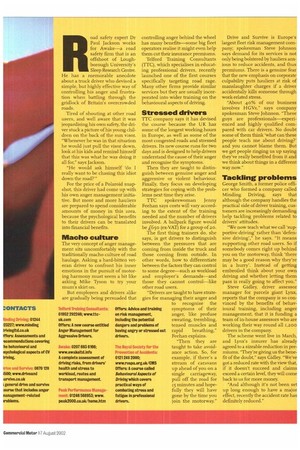R oad safety expert Dr Paul Jackson works for Awake—a road
Page 43

If you've noticed an error in this article please click here to report it so we can fix it.
safety firm that is an offshoot of Loughborough University's Sleep Research Centre. He has a memorable anecdote about a truck driver who devised a simple, but highly effective way of controlling his anger and frustration when battling through the gridlock of Britain's overcrowded roads.
Tired of shouting at other road users, and well aware that it was jeopardising his own safety, the driver stuck a picture of his young children on the back of the sun visor. "Whenever he was in that situation he would just pull the visor down, look at his kids and remind himself that this was what he was doing it all for," says Jackson.
"He would ask himself `do I really want to be chasing this idiot down the road?"
For the price of a Polaroid snapshot, this driver had come up with his own anger management initiative. But more and more hauliers are prepared to spend considerable amounts of money in this area, because the psychological benefits to their drivers can be translated into financial benefits,
Macho culture
The very concept of anger management sits uncomfortably with the traditionally macho culture of road haulage. Asking a hard-bitten veteran driver to confront his inner emotions in the pursuit of motoring harmony must seem a bit like asking Mike Tyson to try your mum's skirt on.
But employers and drivers alike are gradually being persuaded that controlling anger behind the wheel has many benefits—some big fleet operators realise it might even help them cut their insurance premiums.
Telford Training Consultants (FTC), which specialises in educating professional drivers, recently launched one of the first courses specifically targeting road rage. Many other firms provide similar services but they are usually incorporated into wider training on the behavioural aspects of driving.
Stressed drivers
TTC company says it has devised the course because the UK has some of the longest working hours in Europe, as well as some of the most congested roads and stressed drivers. Its new course runs for two days and is designed to help drivers understand the cause of their anger and recognise the symptoms.
Then they are taught to distinguish between genuine anger and aggressive or violent behaviour. Finally, they focus on developing strategies for coping with the problems next time they arise.
TTC spokeswoman Jenny Feehan says costs will vary according to the extent of the training needed and the number of drivers involved, A ballpark figure would be f6 5o (ex-VAT) for a group of 20.
The first thing trainers do, she says, is get drivers to distinguish between the pressures that are coming from inside the truck and those coming from outside, In other words, how to differentiate between the factors they can control to some degree—such as workload and employer's demands—and those they cannot control—like other road users.
"Drivers are taught to have strategies for managing their anger and to recognise the symptoms of their anger, like profuse sweating, trembling, tensed muscles and rapid breathing," Feehan explains.
"Then they are taught to take avoidance action. So, for example, if there's a stream of caravans up ahead of you on a single carriageway, pull off the road for 15 minutes and hopefully they will have gone by the time you join the motorway." Drive and Survive is Europe's largest fleet risk management company; spokesman Steve Johnson says demand for its services is not only being bolstered by hauliers anxious to reduce accidents, and thus premiums. There is a genuine fear that the new emphasis on corporate culpability puts hauliers at risk of manslaughter charges if a driver accidentally kills someone through work-related stress.
"About 40% of our business involves HGVs," says company spokesman Steve Johnson. "These guys are professionals—experienced and highly qualified compared with car drivers. No doubt some of them think 'what can these people teach me about driving?' and you cannot blame them. But we get people ringing us up saying they've really benefited from it and we think about things in a different way now."
Tackling problems
George Smith, a former police officer who formed a company called Minding Driving, says that although the company handles the practical side of driver training, customers are increasingly demanding help tackling problems related to drivers' attitudes.
"We now teach what we call 'supportive driving' rather than 'defensive driving'," he says. "It means supporting other road users. So if somebody comes right up behind you on the motorway, think 'there may be a good reason why they're in a hurry'. Instead of getting embroiled think about your own driving and whether letting them pass is really going to affect you."
Steve Gidley, driver assessor manager for parcels giant Lynx, reports that the company is so convinced by the benefits of behavioural training, including anger management, that it is funding a team of in-house assessors who are working their way round all 1,200 drivers in the company.
The scheme went live in March, and Lynx's insurer has already agreed to a sizeable reduction in premiums. 'They're giving us the benefit of the doubt," says Gidley. "We've got a reduced rate with the view that, if it doesn't succeed and claims exceed a certain level, they will come back to us for more money.
"And although it's not been set up long enough to have a major effect, recently the accident rate has definitely reduced."




























































































































































